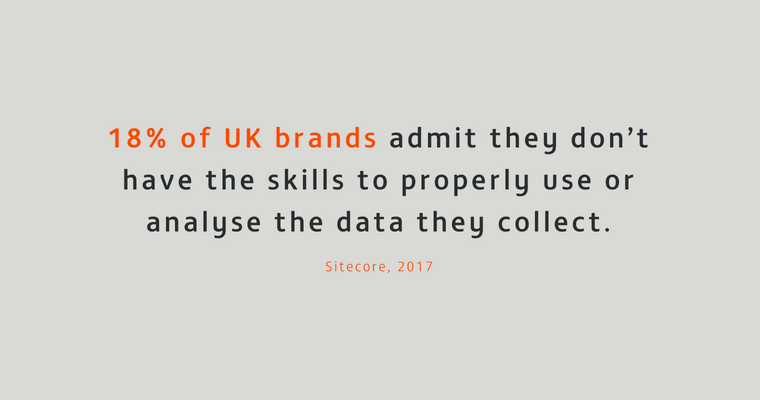How utilities companies can rise to the challenge of digital transformation
Written by Robyn Jones
Digital presents unprecedented opportunities for utilities companies to enhance their offering, streamline their operations, and engage more deeply with their customer base.
Under Ofwat’s new price review, PR19, and Ofgem’s price control framework, RIIO, the two regulatory bodies are urging utilities companies to invest broadly in communication and innovation. Four areas which present particularly big opportunities are data, personalisation, communication, and Artificial Intelligence (AI).
But while the potential rewards are huge, there are challenges too.
It’s telling that gas and electricity switches surged by 28% in 2016, reaching 7.7 million. The ubiquity of digital technology has turned the consumer/supplier relationship on its head, empowering the consumer to compare prices and providers, to switch tariffs and suppliers, and to discuss their experience with other customers - all at the touch of a button.
While the chance to steal a march is clear, utilities companies must carefully plan how to overcome the three key hurdles that stand in the way of success…
1. Strategically managing data
There are serious and ongoing challenges around collecting, storing and managing data. Not least the need to smash data silos and bring information together to provide a single customer view. As Joey Moore, Director of Product Marketing at Episerver says, “If you can reduce the number of moving parts, all the better. It also allows you to make better decisions because you’re using a single, accurate version of the data.”
Collecting the right data is crucial. This means knowing the recency, frequency, monetary value, demographic, and psychographic profile of each data set. But it also means bringing any disparate data sets together to create a holistic view of customers.
“At the moment, all the systems are separate. So billing data is separate to email data, which is separate from the website data. If companies can bring this together, they can extract and use that data in a much more meaningful way.” - Paul Fennemore, CX and Digital Marketing Consultant, Sitecore
When 18% of UK brands admit they don’t have the skills to properly use or analyse the data they collect, and 42% don’t have the capacity to integrate data collection (Sitecore, 2017), time is running out to tackle this issue.

The EU’s new General Data Protection Regulation (GDPR) came into force in May 2018. While many businesses continue to see this as a huge headache, it is sorely needed, and will give companies the impetus they need to clean up their data collection, storage and management.
Darren Shelford, UK waste and utilities practice leader at Marsh says, “Investing in infrastructure to deliver GDPR compliance is [an] opportunity to undertake a systematic review of data management systems and protocols to ensure balance with future bandwidth and system capability requirements – in essence future-proofing.”
As well as ensuring that companies are compliant, it will enable businesses to unlock the power of the data they hold, focusing minds and encouraging best practice.
2. Driving cultural change
People, processes and technology have long been acknowledged as the three major moving parts within an organisation. Perhaps unsurprisingly, people are often the most challenging aspect to change.
It all comes down to culture and, ultimately, behaviours. As technology continues to advance at pace, companies must encourage employees to become forward-thinking, alert to opportunities and open to new, improved approaches.
Jonathan Holcombe, Strategy Consultant at Mando says, “It's about the risk-taking mentality, to want to go out there and try and develop innovative solutions.”
Utilities industries are traditionally composed of legacy companies with heavy assets, and cultures rooted in immunity from competition. This means agility does not come easily. Yet as agile disruptors enter the marketplace, bigger established players have no option but to transform the way they think and behave; to become more nimble.
It's as much about culture as it is about size of the organisation. Some large companies have grown up with digital, and they can make those changes and reflect customer needs. It's the job of utilities companies to drive innovation from within.
As McKinsey & Company says, achieving this agility in the utilities industry is about sensing and then seizing opportunities across new and legacy businesses. Companies must go beyond traditional corporate boundaries to create new ways of working that balance flexibility and stability.
3. Accessing talent
The utilities industry has a growing need for technology specialists who understand both what is possible and what is needed. Technology can, and should, be used to find creative and effective solutions to problems, both internally and externally.

From voice activated services, to personalised tariffs and dynamic marketing, digital has the power to transform the customer experience at the same time as reducing costs for the business. But the human factor remains key to unleashing this potential.
With data playing an increasingly important role, and the arrival of GDPR imminent, having experts who can validate and interrogate the growing volumes of data being collected will be vital to a utilities company’s success. Using big data specialists, data scientists or business analysts who can define and deliver actionable insights, utilities providers need to demonstrate agility and ambition in order to attract the best talent.
It is also critical that digital technologies are supported by commercial and strategic input. If it’s vast potential is to be realised, technology must be understood and directly supported at the top of the business.
“If you haven't got a CTO, or someone at that level who really gets where technology is going, there’s a risk that you’re going to have a mind set all about IT, rather than bringing together digital and physical resources to achieve a great outcome,” says Jonathan Seal, Digital Strategist at Mando. “If companies don't have senior people who grasp that, there is a real risk of falling behind.”
Rise to the challenge
There are many challenges standing in the way of utilities companies and simple, personal, frictionless digital experiences, but they’re not impossible to overcome. Understanding what regulators and customers want from you, and how digital can help you get there is absolutely critical.
What else is going on
-
March 2024
Ghost Spam in GA4 – How to Spot and Deal With It
How to spot and deal with ghost spam in Google Analytics 4 (GA4) to safeguard your data insights. Implement proactive measures to maintain data accuracy.
-
November 2023
Mando to bridge skills gap at BIMA Digital Day
The BIMA Digital Day on November 8th is an attempt to bridge this skills gap, as eight of Mando's experts will spend time with around 240 Year 10 students from The Studio School at their Liverpool campus.


